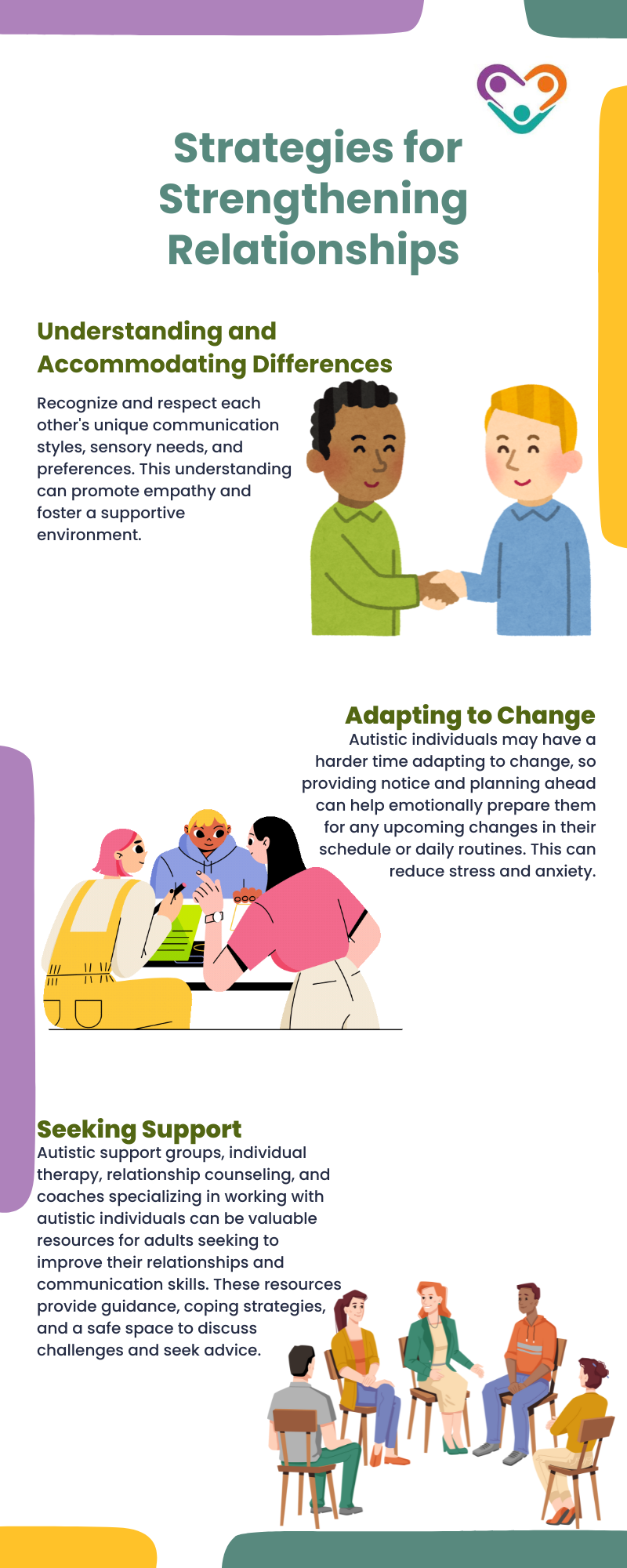Navigating relationships can be a unique and sometimes challenging experience for individuals on the autism spectrum. Understanding the impact of autism on relationships is crucial for fostering understanding and creating a supportive environment.
In this article, we will explore how autism can affect relationships.
Challenges in Adult Relationships
Building and maintaining relationships can pose unique challenges for individuals with autism. Understanding these challenges is important for fostering healthy and meaningful connections.
Some of the key challenges that autistic individuals may encounter in adult relationships include executive functioning difficulties, communication styles, and sensory issues.
Let’s explore each of them in further detail.

Executive Functioning
Executive functioning refers to a set of cognitive processes that help individuals plan, organize, and execute tasks. Autistic individuals often face challenges in this area, which can impact their relationships.
Difficulties with executive functioning may result in struggles with time management, decision-making, and problem-solving. This can lead to misunderstandings and frustration within a relationship.
To mitigate these challenges, it can be helpful for both partners to practice patience and understanding. Creating structure, establishing routines, and providing clear expectations can support the autistic partner in managing their executive functioning difficulties. Open communication and collaboration in decision-making processes can also contribute to a more harmonious relationship.
Communication Styles
Communication styles can vary significantly between autistic and non-autistic individuals, leading to potential misunderstandings and difficulties in relationships. Autistic individuals may struggle to convey their thoughts and feelings in a way that their partner can understand.
Conversely, they may have difficulty interpreting the intentions and messages of their partner due to a lack of clarity.
To enhance communication in an autistic/non-autistic relationship, both partners should make an effort to bridge the communication gap. It can be beneficial to establish open and honest communication channels, allowing each partner to express their needs, concerns, and emotions.
Utilizing visual aids, such as social stories or written instructions, can also enhance understanding and reduce miscommunication.
Sensory Issues
Sensory issues are common among individuals with autism and can significantly impact relationships. Autistic individuals may be hypersensitive or hyposensitive to certain sensory stimuli, such as sound, touch, or light. This heightened sensitivity or reduced sensitivity can lead to discomfort, anxiety, or irritability, affecting their ability to engage in social interactions.
In a relationship, understanding and accommodating sensory sensitivities is crucial. Creating a sensory-friendly environment can help reduce sensory overload and promote a more comfortable and enjoyable experience for both partners.
This may involve minimizing noise, adjusting lighting, or providing sensory aids, such as weighted blankets or noise-canceling headphones.
Communication Strategies
Communication plays a vital role in fostering understanding and strengthening the connection between partners. Clear and effective communication can help navigate challenges and build a strong foundation for a healthy relationship.
Clear communication is crucial in relationships, particularly when one or both individuals are neurodivergent. It is essential to express thoughts, feelings, preferences, and challenges in a way that promotes understanding and minimizes misunderstandings.
For individuals with autism, clear communication can be especially important. They may struggle to convey their thoughts and emotions in a way that their neurotypical partner can fully comprehend.
Conversely, they may also face challenges in understanding the intentions and messages of their partner due to a lack of clarity. This cycle of miscommunication can lead to anxiety and hinder relationship growth.
To improve communication, both partners should strive for open and honest dialogue. This can involve actively listening to one another, expressing oneself clearly and directly, and seeking clarification when needed.
Additionally, using visual aids, social stories, or other communication tools can help enhance understanding and bridge any gaps in communication styles.
Strengthening Relationships
Building a strong and fulfilling relationship requires effort from both partners, including those where one or both individuals are on the autism spectrum. Here are some strategies that can help:

It’s important to remember that each relationship is unique, and what works for one couple may not work for another. By fostering clear communication, understanding, and seeking support when needed, individuals in relationships involving autism can navigate challenges together and build a strong and fulfilling connection.
Insights on Relationship Satisfaction
Understanding how autism affects relationships is essential to providing support and promoting healthy connections. By exploring the experiences and satisfaction levels of individuals with autism in their relationships, we can gain valuable insights into the impact of autism on romantic connections and overall relationship satisfaction.
A 2016 study revealed that a significant majority (73%) of high-functioning autistic individuals surveyed had experienced romantic relationships. This finding challenges the misconception that individuals with autism lack the desire or ability to form intimate connections. In fact, only a small percentage (7%) reported no desire to be in a relationship.
Furthermore, the study highlighted an interesting aspect of autistic relationships. Autistic couples exhibited higher levels of relationship satisfaction compared to autistic-neurotypical couples. This suggests that shared experiences and understanding of each other’s perspectives can contribute to a more fulfilling romantic connection.
Although research suggests that autistic individuals can experience satisfying relationships, it is important to recognize that the duration of these relationships may vary. A 2019 study found that autistic people’s relationships tend to have shorter durations compared to neurotypical individuals. Further investigation is necessary to understand the factors contributing to these differences.
Coping with Challenges
Navigating relationships when one partner has autism can present unique challenges. It’s important to understand and address these challenges in order to foster a healthy and supportive relationship.
Two common challenges that individuals with autism may face are adapting to change and dealing with anxiety.
Adapting to Change
Autistic individuals often have a harder time adapting to change compared to neurotypical individuals. Changes in routines or unexpected events can cause distress and anxiety. In relationships, it’s important to provide notice and plan ahead for any changes that may occur.
This allows the autistic partner to emotionally prepare and adjust their expectations. By providing a sense of predictability and structure, both partners can navigate changes with greater ease.

Dealing with Anxiety
Anxiety can be especially heightened during social situations, such as family gatherings, work events, and parties. These situations may overwhelm the autistic partner, leading them to seek alone time as a coping mechanism. It’s important for the non-autistic partner to understand and respect these needs for solitude, as it is a way for the autistic partner to regulate their anxiety.
However, this need for alone time may be viewed as odd by others, which can cause tension and misunderstanding in the relationship.
Miscommunications also play a role in the challenges faced by individuals with autism in relationships. The autistic partner may struggle to convey their thoughts and feelings in a way that their partner can understand.
Both partners can work together to improve communication by practicing patience, active listening, and finding alternative methods of expression that work for the autistic partner, such as visual aids or written communication.
In conclusion, understanding how autism affects relationships is key to building stronger, more supportive connections. While autism can bring unique challenges, it also offers a chance to see the world from a different perspective, enriching relationships with empathy and patience.
Embracing these differences and communicating openly will allow us to nurture meaningful relationships that thrive on mutual respect and understanding. For more support and resources, explore ABA centers in New Jersey, New York, Georgia, and Indiana. If you have any questions or need personalized guidance, don’t hesitate to contact us at Golden Care Therapy. We’re here to help you navigate these challenges and provide the support you need.



